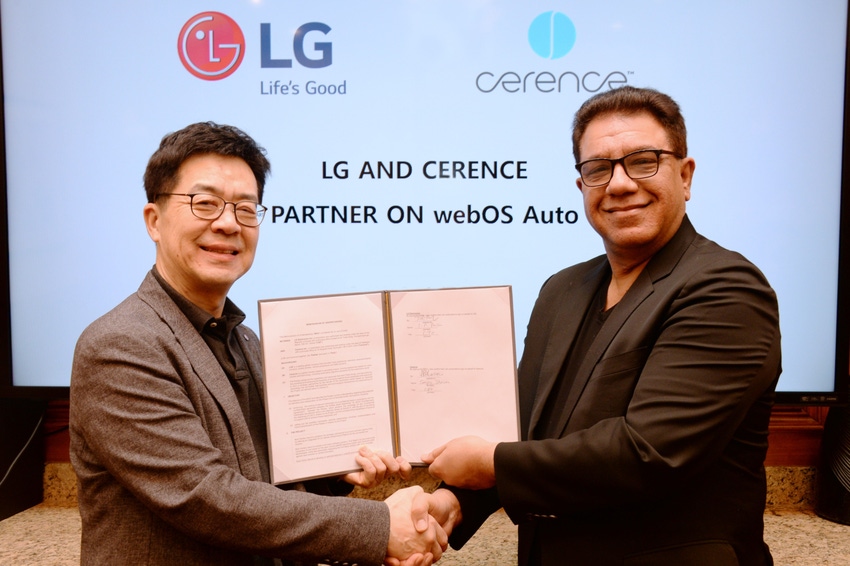LG has signed a memorandum of understanding (MOU) with Cerence to make a play for the emerging connected car market.
January 14, 2020

LG has signed a memorandum of understanding (MOU) with Cerence to make a play for the emerging connected car market.
The partnership with Cerence, which has recently spun-off from Nuance Communications, will integrate LG’s webOS Auto In-Vehicle Infotainment (IVI) system with Cerence ARK (AI Reference Kit), to create a new voice assistant for the connected car market.
“We look forward to this collaboration with Cerence to develop a turnkey voice solution for today’s auto and component makers to accelerate the arrival of the connected car,” said I.P. Park, CTO of LG Electronics. “We will continue to evolve webOS Auto by offering a wider range of AI-powered experiences for both manufacturers and auto customers.”
“We are honoured and excited to partner with LG Electronics on a solution that harnesses the collective power and promise of webOS Auto and Cerence ARK,” said Sanjay Dhawan, CEO of Cerence. “This new offering will support automakers and tier-one suppliers as they rapidly innovate, speed the time to market, and deliver a state-of-the-art in-car experience unlike any other.”
Although still in the early days, the connected car market is accelerating very quickly. LG might be a bit a late to the party here and will have to scrap with some big names from Silicon Valley, the telcos and the OEMs themselves.
Looking at the internet segment, Google has been making promising steps forward with its Android Auto in-car platform, while Amazon has Echo Auto, and Apple has CarPlay to steal some share of the connected car segment. The likes of Huawei and Ericsson are also trying to wrestle attention in the space also.
Albeit distant competitors, some telcos have also shown ambitions to play a greater role in the connected car segment. While it does look like the telcos are destined to be the commoditised connectivity partner, the fortunes of this industry are far from settled.
Finally, you have to consider the car manufacturers themselves. The likes of BMW, Seat and Ford want to create a lasting relationship with customers to drive towards a more sustainable industry in the future. Simply selling and maintaining cars might not be enough but owning the in-car experience is one way to create value and new potential revenue streams.
The winners and losers of the connected car segment are far from settled, but this is quickly becoming an incredibly competitive environment.
About the Author(s)
You May Also Like








.png?width=300&auto=webp&quality=80&disable=upscale)


_1.jpg?width=300&auto=webp&quality=80&disable=upscale)


.png?width=800&auto=webp&quality=80&disable=upscale)